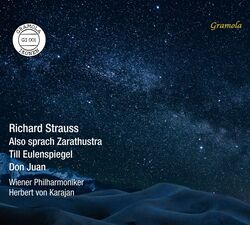Dieses Album vereint Decca-Aufnahmen von 1959 und 1960, die bereits in leicht anderer Zusammenstellung als Decca-CDs erhältlich waren. Verglichen mit der Ovation-Ausgabe von 1988 ist das Klangbild der Gramola-Veröffentlichung etwas weicher und großräumiger, schön transparent und ausgewogen.
Karajan war einer der besten Strauss-Dirigenten aller Zeiten, und diese Interpretationen zeugen von seiner Kunst, diese Musik in all ihrer üppigen Pracht, Ausdruckskraft und Sinnlichkeit hörbar zu machen.
Karajans Verdienst ist es, aus der Tondichtung Also sprach Zarathustra – die ja unendlich langweilig und fade wirken kann – ein schlüssiges Ganzes zu machen, ein Stück, das einen Anfang und ein Ende. hat, mit dazwischen einem Ablauf und nicht einem Sammelsurium von neun ganz verschiedenen Sequenzen, von denen man annehmen könnte, sie hätten nichts miteinander zu tun.
Karajan tut so einmal mehr das Richtige, das, was die Musik am besten zur Geltung bringt. Er kümmert sich wenig um das, was Strauss illustrieren wollte: Die Musik wird fast abstrakt interpretiert und wirkt um ihrer selbst wegen.
Anders ist das im Don Juan, wo die innere Spannung eher vom Handlungsablauf zu kommen scheint, wo Menschen und ihre Gefühle musikalisch dargestellt werden. Die Till-Aufnahme ist ungemein spritzig und spontan, durchgehend ausdrucksstark und phantasievoll.
In den drei Werken realisieren die Wiener Philharmoniker ein Klangspektrum, das mit seiner orchestralen Finesse in allen Hinsichten besticht. Wer die Opulenz großer Orchester mag, hier bekommt er sie auf höchstem Niveau und in einer den Kompositionen sicherlich hundertprozentig angemessenen Form.
Schade, dass die wohl beste je gemachte Aufnahme von Tod und Verklärung (auch mit den Wienern) nicht mehr auf dieses Album passte.
This album combines Decca recordings from 1959 and 1960, which were available on Decca CDs in a slightly different compilation. Compared to the 1988 Ovation edition, the sound of the Gramola release is softer and more spacious, beautifully transparent and balanced.
Karajan was one of the best Strauss conductors of all time, and these interpretations bear witness to his art of making this music audible in all its lush splendor, expressiveness and sensuality.
Karajan’s achievement is to turn the tone poem Also Sprach Zarathustra – which can seem infinitely dull and boring – into a coherent whole, a piece that has a beginning and an end, with a sequence in between, and not a conglomeration of nine completely different pieces that one might assume have nothing to do with each other.
Once again, Karajan does the right thing, the thing that brings out the best in the music. He pays little attention to what Strauss wanted to illustrate: The music is interpreted almost abstractly and works for its own sake.
The situation is different in Don Juan, where the inner tension seems to come more from the plot, where people and their feelings are portrayed musically. The Till recording is incredibly lively and spontaneous, expressive and imaginative throughout.
In all three works, the Vienna Philharmonic realizes a sound spectrum that is captivating in every respect with its orchestral finesse. If you like the opulence of large orchestras, you get it here at the highest level and in a form that is certainly one hundred percent appropriate to the compositions.
It is a pity that the probably best recording of Tod und Verklärung (Death and transfiguration) ever made (also with the Vienna Phil) does not fit on this album.




















